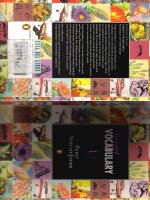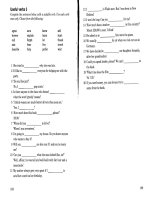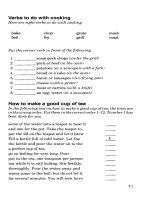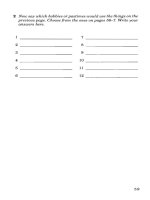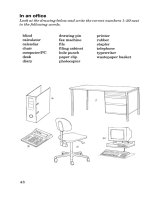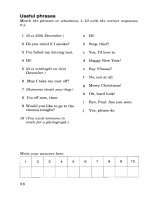topical grammar practice 1 with key
Bạn đang xem bản rút gọn của tài liệu. Xem và tải ngay bản đầy đủ của tài liệu tại đây (14.4 MB, 175 trang )
•
tea
Grammar
Practice
~u!bJ llb!!~QtJ
~'!ittw «AYJntc;tt
•"-
LEARNERS
~UBLISHING
a division of
,
Topical Grammar Practice is a tailor-made series of six practice books for
primary students learning English as a first language and for junior high students
learning it as a foreign language. The contents closely follow the school syllabus .
Each unit covers a specific grammar point in a clear and relevant way, allowing
the young learner to practise both the use and meaning of the grammar point.
The units follow a familiar pattern of practising at both the sentence and text
levels. This is done through MCQs or choosing the correct word in sentences,
and exercises using cloze texts so that students can focus on the language itself
and not be distracted by varying methods and instructions.
Since each unit deals with a precise grammar item teachers are encouraged to
'dip into' the books at any stage to support the language item being taught in the
classroom. This way, these practice books complement the school English
lessons.
The authors strongly believe that, while the English language is the focus, the
context should be meaningful to the learners. Thus, texts have been chosen:
~~
to be cross-curricular: the texts reinforce and support what is being learnt
in other classes .
~)>
to be informative and educational: the texts cover a wide range of topics
of interest to young learners, such as famous people , important places and
events, science and technology, sports , animal life, etc.
~~
to be fun: the texts include especially written stories, traditional folk and
fairy stories, quizzes and dialogues that the students could act out.
~~
to be socia.lly-responsible: the texts include discussions on the
environment and pollution, civic responsibility, etc.
Finally, in the knowledge that teachers are busy people , the series has been
designed to be 'teacher friendly' so it is unambiguous and easy to use.
3
at you'll find in this book
UNIT
4
Page
A note to teachers
3
1
Proper and Common Nouns; Articles a/an
6
2
Regular and Irregular Plural Nouns
9
3
Count and Uncount Nouns
12
4
Masculine and Feminine Nouns
15
5
Adjectives of Quality, Quantity, Size and Colour
18
6
Comparative Adjectives
21
7
Superlative Adjectives
24
8
Subject Pronouns
27
9
Object Pronouns
31
10
Demonstrative Determiners
35
11
REVIEW (1)
38
12
The Verb 'be': am, is, are
45
13
Using am/is/are in Questions and Short Answers
48
14
The Simple Present Tense
52
15
Helping Verbs: do, does, did
55
16
There is/There are
58
17
The Present Continuous Tense (1)
61
18
The Present Continuous Tense (2)
65
19
The Verb 'be': was, were
69
20
The Simple Past Tense: Regular Verbs
73
21
The Simple Past Tense: Irregular Verbs
77
22
There was/There were
81
23
REVIEW(2)
85
24
Talking about the Future (1)
92
25
Talking about the Future (2)
96
26
Imperatives
100
27
The Modal for Indicating Ability: can
104
28
Modals for Indicating Permission: can, may
108
29
REVIEW(3)
112
30
Prepositions of Time
119
31
Prepositions of Place
123
32
Adverbs of Manner
128
33
Adverbs of Time or Place
132
34
REVIEW(4)
136
35
Possessive Adjectives; Using 'have'
to Show Possession
143
36
The Possessive Form with 's
147
37
Simple Sentences
151
38
Question Words; Word Order in Questions
154
39
Conjunctions
159
40
YEAR REVIEW
162
)
5
UNIT
Proper and Common Nouns; Articles a/an
Circle the correct word in brackets.
Example
I would like to be ( a I
actor when I grow up.
1
Take ( a I an ) umbrella with you. lt's raining.
2
Can I borrow ( a I an ) pen, please?
3
Sam rode on ( a I an ) elephant in India.
4
Mr Wang works in ( a I an ) bank.
5
The teacher is wearing ( a I an ) orange dress today.
6
My cousin lives in ( france I France ).
7
Many ( animals I Animals ) can be seen in the zoo.
8
My best friend is called ( anne I Anne ).
9
My uncle lives in ( new york I New York ).
10
6
C!0)
Many people go to the ( beach I Beach ) at the
weekend.
Fill in the gaps with a or an.
An exciting book
I'm reading (1) _ _ _ adventure book about (2) _ __
boy. lt's (3)
exciting story set on (4) _ __
island
in the Pacific Ocean. One day the boy discovers (5) _ _ _
secret cave on (6)
beach, and in this cave he finds
(7)
hidden statue. The statue was put there by
(8)
man who stole it from (9)
(1 0)
museum.
interesting tale develops as the boy tries to return
the statue to the museum.
7
Choose the correct form of the noun in brackets to fill in the gaps.
Christopher Columbus
Christopher (1) _ _ _ _ _ _ _ (Columbus I columbus)
was born in Italy in 1471. He was an (2) _ _ _ _ __
(Explorer I explorer) and a (3) _ _ _ _ _ (Sailor I sailor).
(Earth I earth) was
He believed that the (4)
round and he wanted to sail around the world to prove this.
(5)
(Queen lsabella I queen isabella)
of (6) _ _ _ __ _ (Spain I spain) paid for him to sail with
three (7) _ _ _ __
(Ships I ships) across the
(8) _ __ __
(Atlantic I atlantic) Ocean. He
was the first (9) _ _ _ __
(Person I person) from Europe
to discover (10) _ _ _ __
(America I america).
8
UNIT
Regular and Irregular Plural Nouns
Circle the correct noun in brackets.
Exa m p le
There are
.-----~-----~~-~..,--,..._.,1~___,..,.~..,.,..-__,...--.-...,.......,,----__,...--~
ten(~/
table ) in the classroom.
1
Jim takes a ( bus I buses ) to school every day.
2
There are many ( rose I roses ) in the garden.
3
The fairy gave the girl three ( wish I wishes ).
4
In almost every village in England there is a
( church I churches ).
5
There are a lot of ( fox I foxes ) in the wood.
6
Some ( man I men ) like playing football.
7
We made a lot of ( sandwich I sandwiches ) for the
piCniC .
8
Cats like chasing ( mouse I mice ).
9
I enjoy reading about different ( country I countries ).
10
Marie got a new ( dress I dresses ) for her birthday.
9
Choose the correct noun in brackets to fill in the gaps.
The memory game
This is a (1) _ _ __ _
(game I games) you can play at
parties. First, you must prepare
a tray with many different things
on it. For example, a toy car, a
paper (2) _ _ _ _ _ _ _ (handkerchief I handkerchiefs),
a (3)
a pair of (4)
two (5)
(boxes I box) of matches, two pencils,
(glass I glasses), three marbles,
(watches I watch) and a lot of other
things. Everyone at the party can look at the tray for two
(6) _ _ _ __
(minute I minutes) and must try to remember
everything that is on it. Then you cover the tray with a
(7)
(cloth I cloths) and the (8) _ _ __ _
(winner I winners) is the (9) _ _ _ __
(people I person) who
can remember everything that was on the (10) _ __ _ _
(tray I trays).
10
-Choose 1he correct noun from the box to fill in the gaps.
I
l
countries
people
mice
cows
farms
sheep
zoos
deer
ch~ckensj
ammals
Animals
There are many different types of animals in the world. Some
(1) _ _____ only live in very hot countries, some only live
in cold (2) _ __ __
. A few wild animals like bears and
tigers are kept in (3) _ _ _ _ __ so that people can see them.
A lot of animals like cows and sheep live on (4) _ _ __ _ _
and they give us food and other things. (5) _ _ __ _
give wool and meat, (6) _ _____ give milk, and
(7) _ _ _ _ _ give eggs. Other animals live freely in
the wild like foxes and (8) _ _ _ __
In many countries (9) ______ like to keep animals
as pets. Popular pets are cats and dogs but also rabbits and
(10) _ _ _ _ _ . A mouse is probably not a good pet if you
have a cat as well!
11
UNIT
Count and Uncount Nouns
Decide if the word in colour is a count noun or an uncount
noun. Put a tick in the correct box.
Example
Count Uncount
Noun Noun
There is a lot of water in the bottle.
1
A lot of children like playing video games.
2
There is not much sugar in the bowl.
3
Would you like another burger?
4
In the mountains it can be very cold in the winter.
5
Help yourself to some more rice.
6
Remember to close the windows when you leave.
7
Marie drinks orange juice for breakfast everyday.
8
The tourist arrived with a lot of suitcases.
9
Don't eat too much food before you go swimming.
10
12
We need to buy some toothpaste.
00
DD
DD
DD
DD
DD
DD
DD
DD
DD
DD
Look -at :t he nouns in colour in the text. Circle the 5 count nouns
and underline the 5 uncount nouns.
Going to the beach
When you go to the beach you need to take a lot of things with
you. You need a swimsuit for swimming, and aT-shirt to wear
for playing on the beach. You should wear a pair of sandals to
walk on the hot sand. If the sun is strong, it's a good idea to rub
some sun cream on your skin and to wear a pair of sunglasses
to protect your eyes. Don't forget to take some water to drink and
some food to eat. Remember to clear all your rubbish and throw
it into the rubbish bin.
13
Choose the correct word in brackets to fill in the gaps.
Jo and her mother go shopping
"Let's go shopping," Jo's mother said to her. "We need to buy
(food I foods). We need fruit, some
a lot of (1)
(2)
(kiwi I kiwis), some (3)
(a I some) pineapple. We also
lemons) and (4)
(onion I onions) and
need vegetables such as (5)
(6)
(lemon I
(potato I potatoes). To make a cake for your
(some I a) flour and six
birthday we need (7)
(8)
(egg I eggs). Then
we must go to the butcher's and
buy (9)
(some I a)
meat. On the way home we can
get (1 0)
(some I a)
bread from the baker's."
14
UNIT
Masculine and Feminine Nouns
Circle the correct noun in brackets.
My father is a
(<§Oii~m~ I
policewoman ).
1
My mother's sister is my ( uncle I aunt ).
2
Mr Lee has two children, a son and a ( daughter I girl ).
3
She is a kind ( wizard I witch ) in the school play.
4
( Cows I Bulls ) give us milk.
5
Ben got married last year. His ( wife I husband ) is a
teacher.
6
( Roosters I Hens ) lay eggs everyday.
7
When she was a little girl my ( grandmother I grandfather )
lived in London.
8
That young boy is Mrs Forster's ( niece I nephew ).
9
The ( bridegroom I bride ) looks very beautiful in her long
white wedding dress.
10
Tim wants to be a ( firewoman I fireman ) when he grows up.
15
Look at Carol's family tree. Choose the correct noun in brackets
to fill in the gaps.
Carol's family
I
i l ~~-
Peter & Diana
.----John & Sally ~
~
~
~
A
Paul ~ Carol
Andy
Lisa
~
Felix
@~
l
Sam
An ne -----,
g
Betty
Marie
Carol's (1) _ _ _ __
her (2)
r
(mother I father) is called Sally and
(mother I father) is called John. Carol
has one (3)
(sister I brother) called Lisa and a
(4) _ _ _ _ _ (sister I brother) called Paul. Paul is married
and has a son, Andy, who is Carol's (5) _ _ _ _ __
(nephew I niece). Paul also has a daughter, Marie, who is
Carol's (6) _ _ _ __
is Carol's (7)
(nephew I niece). Sally's sister, An ne,
(aunt I uncle). She has two children,
a (8) _ _ _ _ (son I daughter) Felix, and a (9) _ _ _ __
(son I daughter) Betty. Diana and Peter are Sally's parents. They
are Carol's (10) _ _ __ ___ (grandmother I grandparents).
16
Fill in the gaps with the female form of the masculine nouns in
brackets.
Masculine and feminine words
Some countries have a royal family. A (1) _ _ __ _
(king) is
a (2) _ __ _ _ (male) ruler. Their (3) _ _ _ _ _ (sons)
are (4)
(princes).
You call a (5) _ _ __ _ (man) (6) _
_
_
(Mr)
Smith.
Some jobs have different names for (7) _ _ __ _
t
I
t
A (8) _ _ _ __
(waiter) works in a restaurant and an
(9) _ _ __ _ __
(10) _ _ _ __
(men).
(air steward) works on a plane. An
(actor) makes films.
17
UNIT
Adjectives of Quality, Quantity, Size and Colour
Circle the correct adjective in brackets.
) dress for my birthday.
I
1
Please use a ( tall I blue ) pen to write down the
answers.
2
I live in a ( large I largely ) flat.
3
The teacher told the children a ( funnily I funny )
story.
4
This is a ( use I useful ) exercise.
5
I am ( happy I happiness ) to see my friends.
6
The new neighbour is very ( friend I friendly ).
7
This is a ( good I best ) book.
8
There is a very ( highly I high ) tower in the city.
9
The children had a ( short I shorts ) break.
I
I,
10
18
The planet Mars is ( red I redder ).
Choose _~he adjective in brackets to fill in the gaps.
Greece
Greece is a country in Europe.
The capital city is Athens, which f2:::;;;:;;;252S~~N%T,.,.,._~=is a very (1) _ _ __ _ _
(beautiful/ beauty) city with
many very (2) _ _ _ _
(elder I old) monuments. One
very (3)
(fame I famous) monument is the
Acropolis. There are lots of islands in Greece, so there is a very
(4)
(long /length) coastline. Many tourists go to
Greece on holiday to enjoy the warm (5)
yellow) sea and to eat the (6)
food. Greeks eat a lot of (7)
(blue I
(taste I tasty) Greek
(freshly I fresh) fish
and vegetables. Greek houses are usually (8) _ _ __ _
(white I whiter) and have (9)
(flat I flatly) roofs.
People can use these roofs to dry the fruit in the (1 0) _ _ __
(hot I hottest) summer and collect rainwater in the winter.
19
Find 10 adjectives in the text and circle them.
Dinosaurs
Dinosaurs were large animals that lived a very long time ago. No
one has ever seen a dinosaur, but people have found very old
bones and have put them together to make a skeleton. There
were different types of dinosaur: very tall ones which ate leaves
from trees, small ones with wings that could fly, and those with
very sharp teeth, which ate other animals. We don't know what
colour they were, but we think they were brown. If we saw a
dinosaur today we would probably feel frightened because they
were so big and they could run fast too. Dinosaurs died out, but
we don't really know why.
20
UN IT
Comparative Adjectives
Circle the correct form of the adjective in brackets.
Example
London is ( big
I~) than Madrid.
1
Bill is ( old I older ) than Josie.
2
A horse is ( large I larger ) than a dog.
3
Learning to swim is ( more difficult I
difficult ) than learning to walk.
4
A flat is usually ( smaller I small ) than a house.
5
Some exercises are ( easy I easier ) than others.
6
Riding a motorcycle is ( dangerous I more dangerous )
than walking.
7
Travelling by plane is ( more expens1ve I expensive ) than
travelling by bus.
8
Your handwriting is ( good I better ) than mine.
9
If you eat so many sweets, you will be (fatter I fat) than me.
10
J
I felt ( bad I worse ) than I did yesterday, so I didn't go to
school.
21
Fill in the gaps with the comparative form of the adjective in
brackets.
Shopping
Supermarkets are stores that sell food and many other things.
Supermarkets are (1) _ _ _ _ _ (large) than grocery shops.
They sell (2) _ _ _ __ (cheap) food than small shops.
Shopping in a supermarket is often (3) _ _ _ _ _ (quick) than
in small shops because you can choose the food yourself. Small
shops are (4) _ _ _ _ _ (friendly) than supermarkets. You
can get to know the shopkeepers (5) _ _ _ __ (good).
.
11
I think markets are (6) _ _ _ _ _ _ _ _ (interesting)
places than supermarkets because they are (7) _ _ _ _ _
(busy) and (8) _ _ _ _ _ _ _ (crowded) with lots of noise
and people.
In big cities there are department stores that sell almost
everything. These are (9) _ _ _ _ _ (easy) places to shop in
than markets because everything is in one place, but they can be
(10) _ _ _ _ _ _ _ (expensive).
22
-Fill in the gaps with the comparative form of the adjective in
brackets.
The country and the town
Living in the country can be (1) _ _ _ _ _ (nice) than living
in a town because the houses are (2) _ _ _ _ _ _ _ __
(spacious} and (3) _ _ _ _ _ _ _ _ (comfortable) with
(4) _ _ _ _ _ (big) gardens. Towns have (5) _ _ _ __
(many) traffic and are (6)
(7)
flats are (8)
(noisy), but there are
(exciting) things to do and see. The
(small) and houses are (9) _ _ __
(close) together. Some people think towns are (10) _ _ _ __
(good) places to live in, and some people prefer the country.
23
UNIT
Superlative Adjectives
Circle the correct form of the adjective in brackets.
Example
London is the ( bigger
/~)city in Europe.
1
Everest is the ( higher I highest ) mountain in the world.
2
The ( easier I easiest ) exercises are at the beginning.
3
The Pacific Ocean is the ( largest I larger ) ocean in the world.
4
The ( most expensive I more expensive ) watches are made
of gold.
5
The River Nile is the ( long I longest ) river in Africa.
6
Singapore is the ( clean I cleanest ) city I know.
7
Tea is the ( more popular I most popular ) drink in Britain.
8
Leon got top marks in all the tests. He's the ( best I better )
student in the class.
9
10
Water is the ( cheap I cheapest ) drink in a restaurant.
I got 5 out of 10 for the Maths test. lt was the ( worst I bad )
mark I had in all the tests.
24
-Fill in lhe gaps with the superlative form of the adjective in
brackets.
Seasons
In the northern part of the world there are four seasons.
Summer is the (1)
(hot) season as the sun is
(close) to this part of the Earth. So there is
(2)
also more daylight. The (3) _ _ _ _ _ (long) day of the year
is 21 June. The sun rises at the (4) _ _ _ _ _ (early) time and
sets at the (5) _ _ _ __ (late) time of the year. Summer is
the (6) _ _ _ __ _ _
(popular) time for holidays.
Winter is the (7) _ _ _ __
.....~--I..L..---:;==1
(cold) season, and the days are ~~f-1 ~
the (8) _
_
_
_
(short)
of the year. Spring is the
(9) _ _ _ _ _ (wet) time of
the year as it rains a lot. Some people think that autumn is the
(10) _ _ __ ____· (beautiful) season because the leaves
on the trees change colour and are very pretty.
25
